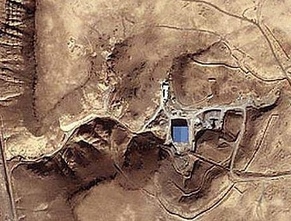|
World Jewish News

Suspected Syrian nuclear facility reportedly bombed by Israel in 2007.
|
Satellite images expose covert Syria nuclear facility
24.02.2011, Israel and the World Satellite images show a Syrian nuclear facility thought to be related to the one Israel reportedly destroyed in a 2007 strike was in fact a uranium conversion site, a U.S.-based research institute reported on Wednesday.
The report comes as Syria continues to claim that the Dair Alzour site bombed in a 2007 aerial strike was not a nuclear facility, while it also continues to prevent United Nations scientists from inspecting the site, with the last such visit taking place in 2008.
In late December 2010, Haaretz cited a report by the German newspaper Sueddeutsche Zeitung, alleging that three news site linked to the one allegedly bombed by Israel in 2007 had been uncovered.
On Wednesday, however, Washington's Institute for Science and International Security cited another Sueddeutsche Zeitung report saying that recent satellite images showed one of the sites to be a "small uranium conversion facility," adding that the site was "functionally related" to the reactor Israel reportedly destroyed in 2007.
The report, relating to a compound outside the town of Marj as Sultan, near Damascus, said that the facility was intended for "processing uranium yellowcake into uranium tetrafluoride (UF4)."
"This facility could have been related to the process of making fuel for the planned al Kibar reactor," the report stated, citing the location of the reactor Israel bombed.
ISIS claimed, in addition, that the photos also uncovered Syrian attempts to conceal their nuclear attempts.
Late last year, the United States warned Syria on Friday it may face action by governors of the United Nations nuclear watchdog if Damascus continued to black attempts to give its inspectors access to the remains of a suspected nuclear site in the desert.
U.S. intelligence reports have said it was a nascent North Korean-designed reactor geared to produce bomb fuel. Syria, an ally of Iran which is under IAEA scrutiny over its uranium enrichment drive, denies hiding nuclear work from inspectors.
Glyn Davies, Washington's IAEA envoy, said in a speech posted on the U.S. mission's website on Friday it was "urgent and essential" that Syria heed UN inspectors' requests for extended access to sites, personnel and material.
"Absent clear action by Syria to cooperate fully with the IAEA, we are rapidly approaching a situation where the (IAEA) board (of governors) and secretariat must consider all available measures and authorities...," he said.
Davies said earlier this year that a number of countries were beginning to ask whether it was time to invoke the IAEA's "special inspection" tool to give its inspectors the authority to look anywhere necessary in Syria at short notice.
The Vienna-based, UN-affiliated body last resorted to such a prerogative in 1993 in North Korea, which still withheld access and later developed nuclear bomb capacity in secret.
Syria is seen as unlikely to yield to a special inspection. Diplomats and analysts believe the IAEA will refrain from escalating the dispute at a time of rising tension with Iran, which the West suspects of seeking nuclear weapons.
Haaretz.com
|
|
